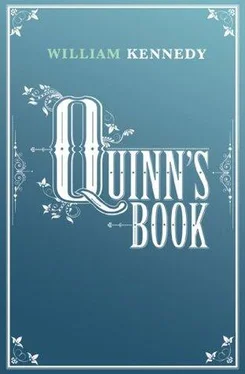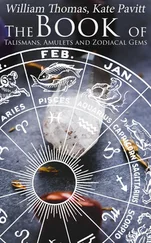“Remember, Daniel. The only thing worth fighting for is what is real to the self. Move toward the verification of freedom, and avoid gratuitous absolutes.”
I confess I did not know what he meant by the two final words, but which are exact, for I recorded them indelibly on my memory because of their strangeness. Will also added that I should be wary of marriage “before the age of comprehension,” which he placed at twenty-five. “No man younger than that has any idea what women are all about,” he said. “And while after twenty-five they have even less, they are somehow readier for the game.”
His speech brought tears to Hillegond’s eyes, for it made my departure increasingly real to her: yet another adventure of the heart taking its leave. She gave me quite contrasting counsel as to matters of love.
“I know you and Maud saw what happened on the night Magdalena came back from the dead,” she said. “I did not see you there, but John did, and he enjoyed the audience. I won’t apologize for what you saw, but I do say that life is never what you think. We seem to discover love in the most awkward places, and not always with the appropriate people. But Daniel, young dear of our hearts, love is better than wheat. Love is worth what it costs to find it, and I do know you’ve found it. I also know you know everything that I say before I say it. You are such a smart boy — smarter than Dirck was at your age, and he was smart as a Dutchman’s thirst. I shall miss you, Daniel Quinn, and I demand that you come back as soon as you can and make your home here. Bring Maud if you like, and if not her, then another. But you have made yourself valuable to the Staats family, and you shall never want again as long as we live. God bless your good sense and Godspeed on your new journey.”
I had my train ticket in hand and was packed and ready for departure well before the appointed hour. Emmett Daugherty came to pick me up, and said we’d have to watch the Irish circus before I left, a comment that confused me. But he explained that today was the departure day as well for the new immigrants: homeless Irish who had come to Albany to find life, and finding none, were being ushered elsewhere — driven, really, from the city by authorities unable to cope with the mounting cases of Ship Fever the newcomers had brought with them. It was widely held that fever could not prosper in open spaces, and so the immigrants were being sent to the western plains, where they could build cabins, and forage in the outdoors for their lives, becoming as one with the wilderness, safely distant from the fetid city, where fever seeds wax strong.
I embraced Matty and Capricorn in turn, vowing I would see them both again, then was smothered in my final enfolding by Hillegond and her abundant bosom, which made me weep with love for the woman to whose open arms I swore anew that I would filially return.
I climbed onto the seat of Emmett’s open wagon as he threw my baggage aboard, and I turned my final gaze upon the mansion, its shrubbery, its turrets, its gables and conical towers, its sprawling porches and beautiful lawns of intense verdancy, its acres of bosky slopes, and that vast metabosky terrain I had always judged to be the Staatses’ primeval forest, and along which their road coursed toward the city. All this I surveyed with saddened eye, for I knew that this time I was truly leaving, perhaps never to return, despite my avowals, and sensing in my most anxious reaches that this was all slipping away forever, even before I had begun to command power over its lushness. This was no longer mine, and I was to be alone on the road, a waif in gentleman’s clothing, aimless and homeless, pointing myself in the vague direction of an even more vaguely defined duty to a stranger I barely knew but loved with unquestioning fervor.
I wept openly upon my separation both from the grandeur of this vision and from Hillegond’s chest full of heat. And then, as I accepted the unknowable emptiness of my future, Emmett clucked his horse into motion.
And so goodbye.
We saw signs of Emmett’s circus as we neared the railroad station: mobs of people being herded out of the city by constables and sheriff’s men on horseback. I sat beside Emmett in his wagon and we watched them pass.
“Pay heed to these people and remember what you see,” he said to me, and I remember him as vividly as the rest, his great wavy mane of black hair crowning him with handsome abundance, his eyes as strong as nuggets of iron. And so in memory I heed him as much as I heeded that troubled throng. Here came a man with two children on his shoulders and three more in tow, a woman nursing slung babies at both naked breasts as she walked along. The day was chill, but some men walked bare-chested, galluses holding their trousers, their feet in rotting boots. A man with a bull terrier under his arm had grown neck whiskers like a dog collar, his face otherwise clean of hair. A boy in a small cart drawn by a jackass played on the pennywhistle a Gaelic air I remember my father whistling, and naughty women with chemises visible and skirts flying threw visions of hip and thigh at men and women both (one of them eyed me), taunting in the Irish tongue all who watched the parade from windows and doorways. One man wore no shoes, his feet wrapped in cloth. Another carried a short club, the Irishman’s gun, ready for impromptu battle. Men wore hobnail boots, hats of straw and felt, caps of leather and fur, tall hats, plug hats, sailor hats, vests. Women wore bonnets and shawls or nothing on their heads, sweaters, tattered coats, threadbare cloaks, long skirts. They carried brooms, and straw boxes, bags and valises tied with rope. Their stockings were rolled, their hair in buns or loose to the middle of their back like my mother’s, some of the loose-haired ones loose as well with affection to the men who pawed and patted them as they walked, those patters clad in tailcoats and knee britches with holes in the knees, men carrying pails and whiskey bottles and a small pig in a basket. One man pissed like a horse in the street, and an entire clustered family of six gripped one another’s hands in fearful dignity.
Emmett told me stories of some of these people. He had been moving among them for a week to hear their tales, discover news from Ireland, help where and how he could. His concern for them was missionary: he had been one of them himself when he came here. His fervor to work for their betterment would grow in him with the passing years and affect my life profoundly. He told me of one man who stole a sack of horsehides, was arrested trying to sell them back to their owner and went to jail for it, leaving his family destitute. He told of a man long off the whiskey who came home drunk and singing and urged his sullen wife to sing with him, but she would not, and so he beat her with a crock and went to jail for it, leaving her destitute.
“They’re lost, most of them,” Emmett said to me. “And who wouldn’t be? They’ve left all they knew, and all they’ve got is what they can wear and carry. But if lost it is, then some say this is the land to be lost in, for it all comes right again here. Would you agree to that, lad?”
I nodded my head yes, but I thought of Dirck and his absent tongue, and of lost Joshua and his fugitive life, and of the dead Swede who could no longer agree life would come right again; and it remained to be seen whether the lives of the Ryans would ever again be other than a tissue of days with open sores.
“Look at them,” Emmett said to me. “Study the face and the eyes and the gait of the walking misery that’s come to visit.”
They passed on then, the last of them, and Emmett followed their steps with his horse and wagon. Ahead we could see them climbing into the railroad carriages that would take them west, the carriage windows down, some wet wash and portable bedding already getting the air, the children barefoot and on holiday, racing on the cobbles and gravel, a snarling dog clubbed by a militiaman’s rifle, a piglet dropped and running loose beneath a carriage. I scrambled under the car to catch it, but the pig could run faster than I could crawl, and it ran into the tall grass by the tracks, lost forever to the old man who dropped it.
Читать дальше












